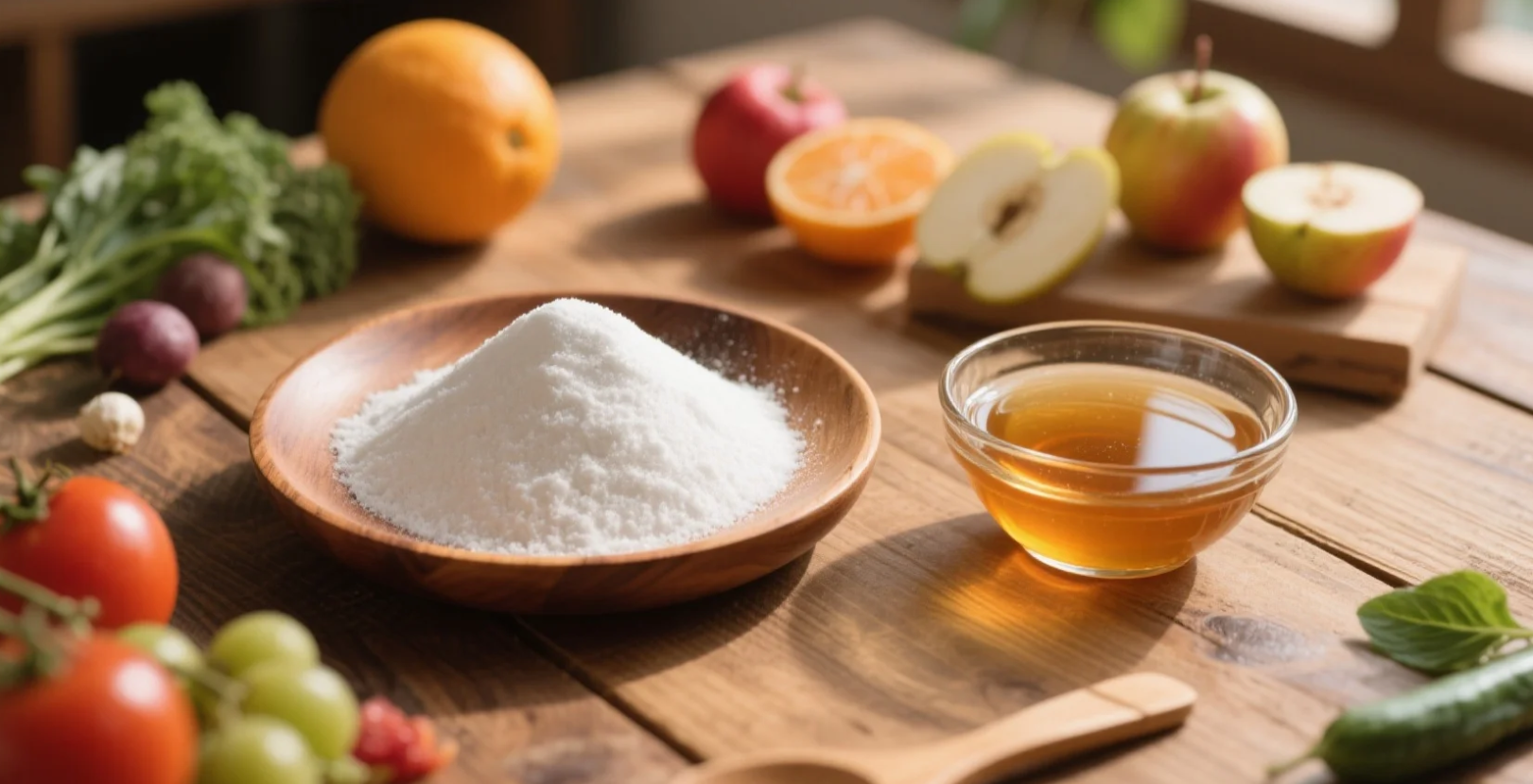Table of Contents
As food manufacturers, formulators, and product developers continue shifting toward clean-label, low-calorie, and sugar-reduced formulations, two natural sweeteners often take center stage: organic allulose syrup and erythritol. Both are popular alternatives to traditional sugars, and each offers unique advantages depending on the application. But when it comes to real-world recipe performance, which sweetener truly stands out?
This article compares organic allulose sweeteners—including organic allulose syrup and organic crystalline allulose—with erythritol in terms of taste, functionality, stability, processing behavior, and suitability for different food and beverage categories.
1. Sweetness Profile and Taste Experience
One of the biggest challenges in sugar-reduced product development is achieving a clean, pleasant sweetness without off-notes. Here is where organic allulose shines.
Organic Allulose Syrup
- Approximately 70% as sweet as sucrose, offering a natural, clean sweetness.
- No cooling sensation.
- No bitterness or aftertaste.
- Mouthfeel similar to sugar, especially in syrup form.
Erythritol
- About 60–70% as sweet as sucrose.
- Distinct cooling effect, which can be undesirable in baked goods or beverages.
- May leave a slight dryness in mouthfeel.
Verdict:
For applications requiring a sugar-like taste—such as drinks, sauces, and bakery fillings—organic allulose syrup provides a closer match to sucrose.
2. Functional Performance in Recipes
Beyond sweetness, sugars affect texture, browning, moisture retention, and overall structure. Functional performance is an area where the differences between organic allulose and erythritol become even more visible.
Browning & Caramelization
- Organic allulose syrup caramelizes similar to sugar, making it ideal for baked goods, cereals, pastries, chocolates, and confectionery coatings.
- Erythritol does not caramelize, making it unsuitable for recipes requiring browning or a golden finish.
Moisture Retention & Softness
- Organic allulose has excellent humectancy, helping retain moisture.
- Erythritol tends to crystallize, leading to gritty textures in fillings or bars.
Texture & Binding
- Organic allulose syrup works as a binder, perfect for granola clusters, protein bars, and gummies.
- Erythritol is less effective as a binder and can cause brittleness in certain products.
Verdict:
For texture-sensitive applications—bars, cookies, brownies, gummies, sauces—organic allulose syrup performs noticeably better.
3. Digestive Tolerance
Consumers increasingly care about digestive comfort.
Organic Allulose
- Generally well tolerated.
- Does not commonly cause digestive discomfort when used within normal serving ranges.
Erythritol
- Better tolerated than most sugar alcohols.
- However, very high usage levels may cause bloating or gastric discomfort in sensitive individuals.
Verdict:
Both are acceptable for digestive wellness, but organic allulose offers a more sugar-like feel without the “sugar alcohol” perception.
4. Clean-Label and Organic Certification
More brands seek clean-label and certified-organic ingredients.
Organic Allulose Syrup (from ORGANICWAY)
- Available in certified organic grade.
- Extracted from natural plant sources like corn or tapioca.
- Fits USDA Organic, non-GMO, and clean-label formulations.
Erythritol
- Most erythritol on the market is not organic.
- Many versions are made via fermentation from non-organic glucose.
Verdict:
For brands building organic, non-GMO, and natural-positioned products, organic allulose syrup is the clear winner.
5. Application Suitability
Different applications benefit from each sweetener, but many modern formulations increasingly choose organic allulose.
Best Uses for Organic Allulose Syrup
- Organic beverages
- Bars and granola clusters
- Sauce and syrup manufacturing
- Ice cream and frozen treats
- Gummies and confectionery
- Baking mixes
- Low-calorie sports drinks
- Premium organic product lines
Best Uses for Erythritol
- Keto-friendly dry blends
- Sugar-free tabletop sweeteners
- Low-calorie candies where cooling effect is desirable
6. Final Comparison: Which Performs Better?
For most real recipe performance scenarios, especially in B2B manufacturing, organic allulose syrup delivers:
- Better sweetness profile
- Better texture
- Better browning and caramelization
- Better moisture control
- Better clean-label compatibility
- Better consumer perception
While erythritol still has its place in certain dry blends or cost-sensitive applications, organic allulose syrup is rapidly replacing it in modern food formulations due to its superior resemblance to sugar.
Why Choose ORGANICWAY Organic Allulose Syrup?
ORGANICWAY supplies premium organic allulose syrup and organic allulose powder, produced under strict quality standards to meet the needs of international organic food manufacturers. Our products offer:
- Certified organic quality
- Non-GMO, clean-label positioning
- Excellent functional performance in diverse applications
- Stable supply and consistent specification
Whether you are developing a new low-sugar beverage, baking product, nutritional bar, or vegan confectionery, our organic allulose sweetener solutions provide the performance you need.
Related Products
Organic Allulose Sweetener
Source premium Organic Allulose Powder and Syrup. A clean-label, low-calorie, non-glycemic rare…
Organic Erythritol
Appearance: White Crystalline Powder Or Particles Other Name: Erythritol sweetener, Erythritol sugar,…
